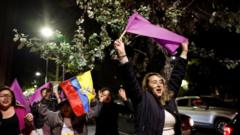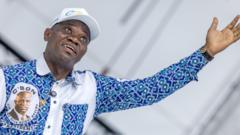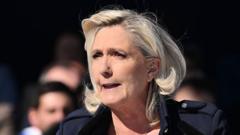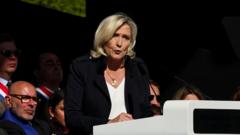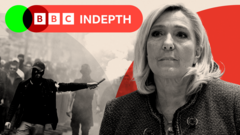Gabon’s military leader, Gen Brice Oligui Nguema, has emerged victorious in the presidential election, receiving more than 90% of the votes after leading a coup that ended a 60-year rule by the Bongo family. His victory, marked by a high voter turnout, raises concerns over the fairness of the electoral process, although many citizens express relief at the end of dynastic governance.
Gabon Elects New President Following Military Coup
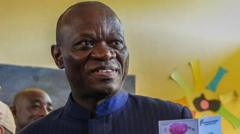
Gabon Elects New President Following Military Coup
Gen Brice Oligui Nguema secures a decisive victory with over 90% of the vote in historic election.
In a pivotal moment for Gabon, the military leader Gen Brice Oligui Nguema has been elected as the new president, securing a staggering 90% of the votes in a recent election that follows the coup he led against President Ali Bongo in 2023. Nguema’s win, which translates into a seven-year mandate, has landed him firmly in power, with the electorate feeling a sense of liberation from a political dynasty that had ruled for six decades.
The elections took place on Saturday, and provisional results were announced by Interior Minister Hermann Immongault, who stated that Nguema garnered 575,222 votes. His nearest competitor, former Prime Minister Alain Claude Bilie-by-Nze, received just over 3% of the vote. Despite a reported voter turnout exceeding 70%, some voters and opposition figures raised concerns about electoral irregularities, casting a shadow over the election's legitimacy.
Critics suggested that changes to the constitution and electoral codes had paved a preferential path for Nguema, limiting the participation of potential opposition leaders. The former commander of the elite Republican Guard has promised to address the deep-seated issues of corruption and governance that plagued the Bongo administration.
Despite its wealth from oil and timber, Gabon faces significant socio-economic challenges, with around 35% of its population living below the poverty line. As Nguema embarks on his presidency, he faces the dual tasks of rebuilding trust in government and improving the living conditions of the Gabonese people.
With the promise of a new dawn for the central African nation, the electorate remains hopeful, looking toward a future beyond the shadows of dynastic rule.
The elections took place on Saturday, and provisional results were announced by Interior Minister Hermann Immongault, who stated that Nguema garnered 575,222 votes. His nearest competitor, former Prime Minister Alain Claude Bilie-by-Nze, received just over 3% of the vote. Despite a reported voter turnout exceeding 70%, some voters and opposition figures raised concerns about electoral irregularities, casting a shadow over the election's legitimacy.
Critics suggested that changes to the constitution and electoral codes had paved a preferential path for Nguema, limiting the participation of potential opposition leaders. The former commander of the elite Republican Guard has promised to address the deep-seated issues of corruption and governance that plagued the Bongo administration.
Despite its wealth from oil and timber, Gabon faces significant socio-economic challenges, with around 35% of its population living below the poverty line. As Nguema embarks on his presidency, he faces the dual tasks of rebuilding trust in government and improving the living conditions of the Gabonese people.
With the promise of a new dawn for the central African nation, the electorate remains hopeful, looking toward a future beyond the shadows of dynastic rule.



